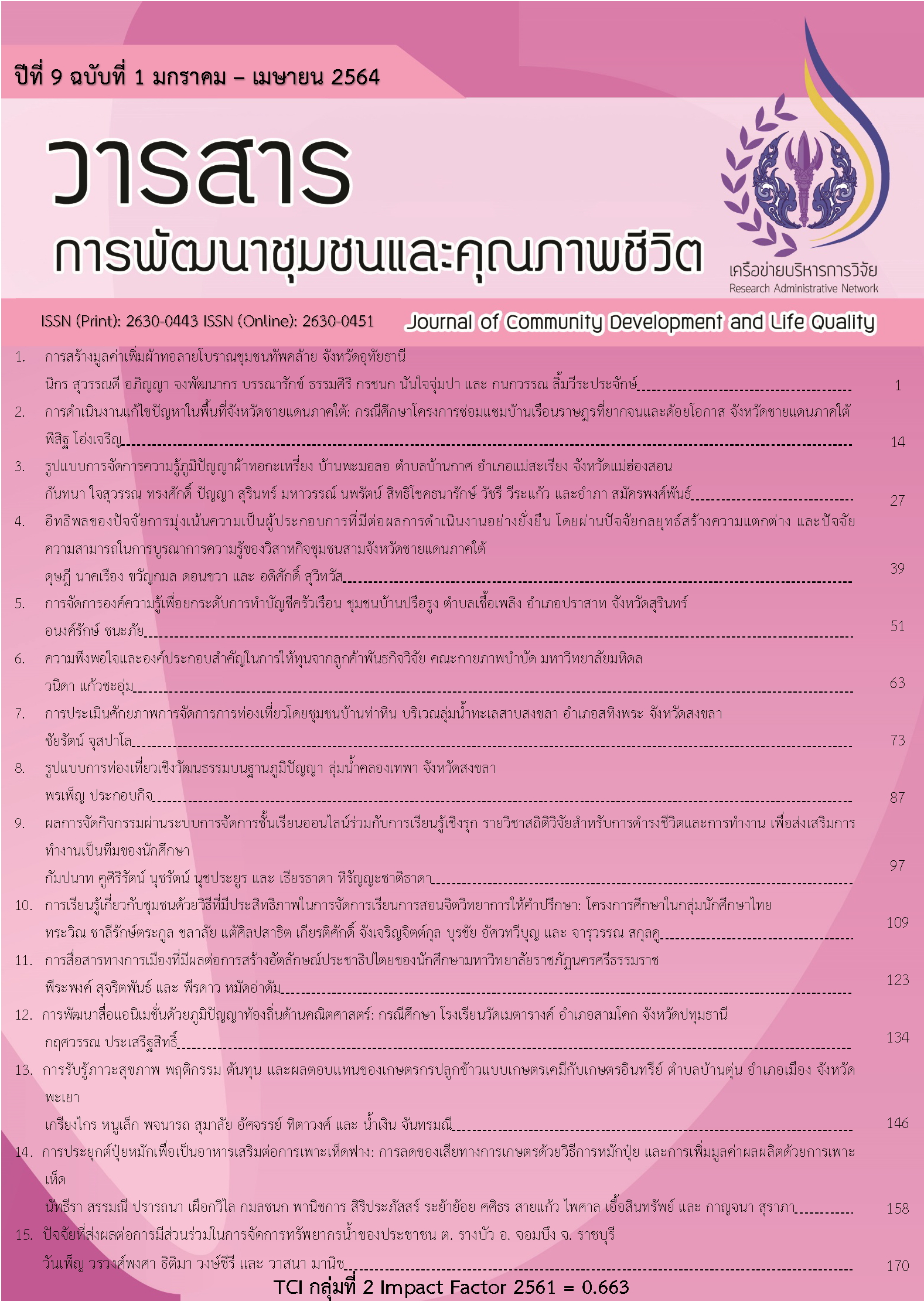การสื่อสารทางการเมืองที่มีผลต่อการสร้างอัตลักษณ์ประชาธิปไตย ของนักศึกษามหาวิทยาลัยราชภัฏนครศรีธรรมราช
Main Article Content
บทคัดย่อ
งานวิจัยชิ้นนี้มีวัตถุประสงค์เพื่อ ศึกษาระดับของสื่อ ปัจจัยที่มีผลต่อการสร้างอัตลักษณ์ประชาธิปไตย เปรียบเทียบแยกปัจจัยส่วนบุคคล ประชากรนักศึกษาจำนวน 8,735 คน คำนวณ Taro Yamane ได้ 382 คน ใช้สถิติค่าความถี่ ค่าร้อยละ ค่าเฉลี่ย ค่าเบี่ยงเบนมาตรฐาน t-test F-test พบว่า สื่อบุคคลมีผลมากที่สุด และเพศต่างกันมีผลด้านสื่ออิเล็กทรอนิกส์แตกต่างกันที่ระดับ .05 อายุต่างกันมีผลด้านสื่ออิเล็กทรอนิกส์ ด้านสื่อเฉพาะกิจ และด้านสื่อออนไลน์ ที่ระดับ .001 ศาสนาต่างกันมีผลด้านสื่อบุคคลแตกต่างกันที่ระดับ .001 คณะที่ศึกษาต่างกันมีผลด้านสื่ออิเล็กทรอนิกส์ ด้านสื่อออนไลน์ ที่ระดับ .001 ด้านสื่อสิ่งพิมพ์ ด้านสื่อเฉพาะกิจ ที่ระดับ .05 ชั้นปีต่างกันมีการสร้างอัตลักษณ์ประชาธิปไตยด้านบุคคล ด้านสื่อสิ่งพิมพ์ ด้านสื่อออนไลน์ ที่ระดับ .001 ด้านสื่อเฉพาะกิจที่ระดับ .01 สื่ออิเล็กทรอนิกส์ที่ระดับ .05 ภูมิลำเนาต่างกันมีผลด้านสื่อบุคคล ด้านสื่อสิ่งพิมพ์ ด้านสื่ออิเล็กทรอนิกส์ ด้านสื่อเฉพาะกิจ และด้านสื่อออนไลน์ ที่ระดับ .001
Article Details
กองบรรณาธิการขอสงวนสิทธิ์ในการตรวจและแก้ไขบทความที่เสนอเพื่อตีพิมพ์ในวารสารการพัฒนาชุมชนและคุณภาพชีวิต
บทความหรือข้อความคิดเห็นใด ๆ ที่ปรากฏในวารสารการพัฒนาชุมชนและคุณภาพชีวิต เป็นวรรณกรรมของผู้เขียนโดยเฉพาะคณะผู้จัดทำไม่จำเป็นต้องเห็นด้วย และไม่ใช่ความรับผิดชอบของมหาวิทยาลัยและคณะผู้จัดทำ / บรรณาธิการ
เอกสารอ้างอิง
Apidennphalai P. 2019. Political communication, popularity, advantage and political system that culminate in public decision making for politicians to be elected: A case study of Samut Prakan province, Zone 2. Journal of MCU Peace Studies 7(5): 1352-1362 (in Thai)
Aunnuim, W. 2012 Phenomenal digital communication. Journal of the Association of Private Higher Education Institutions 18(2): 212-221 (in Thai)
Chansong, S. 2020. Communication for development of potential for self-reliance and promotion of occupations for the community: A case study of Ban Mae Thalu, Sop Moei district, Mae Hong Son province. Journals of Community Development and Life Quality 8(2): 412-423 (in Thai)
McGraw, M.K. 2000. Contributions of the cognitive approach to political psychology. Political Psychology 21(4): 805-832.
Nakata, T. 2000. Thai Democracy. Sahai Block and Printing, Bangkok. (in Thai)
Nakata, T. 2003. Thai Lifestyle: Political Culture of the New Generation. Sahai Block and Printing, Bangkok. (in Thai)
Petchbordee, L., N. Naressenie and B. Pairindra. 2015. The performance management of municipalities in Samut Prakan province. Journal of Graduate Studies Valaya Alongkorn Rajabhat University 9(3): 184-196 (in Thai)
Promgrid, P. 2014. Democracy development and democratic political culture building. Parliamentary Journal 62(7): 9–43
Richard E.D. and K. Prewitt. 1969. Political Socialization. American Political Science Review 63(4): 1293-1294.
Tancharoen, B. 2017. The online political news exposure behaviors of students in Dhonburi Rajabhat University Samutprakan. Lampang Rajabhat University Journal. 6(1): 67-75. (in Thai)
Thamrongthanyawong, S. 1999. Politics: Concept and Development. Sema Dharma Publishing, Bangkok. (in Thai)
Thongyoo, D. 2014. Guideline for developing adolescent self-esteem based on self-efficacy theory. Valaya Alongkorn Review 4(2): 179-190 (in Thai)
Worapan, D., C. Keskowit and W. Samranvedhy. 1993. Political Behavior and Communication during the General Election Campaign 1993. Thamasart University Press, Bangkok. (in Thai)


